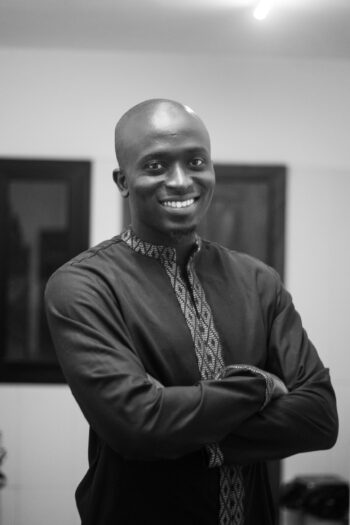Moustapha Seck Brings Lassonde’s mission to life
Tags:

Article written by Elaine Smith
Electrical and electronic engineering graduate Moustapha Seck, an entrepreneur now based in Ghana, is an alumnus who has taken the mission of York University’s Lassonde School of Engineering to heart.

Seck’s young company, Fluid Finance Technologies, provides opportunities for loans, access to market and guidance to smallholder farmers in Ghana, farmers who work small plots of land, struggling to farm profitably year after year. His work perfectly embodies Lassonde’s aim to “cultivate new ideas and knowledge and contribute towards a more sustainable world for all.”
“Creating opportunities for people in the Global South is my calling,” writes Seck on his LinkedIn page.
“I was extremely fortunate to get an education,” he says in an interview, “and I want to create opportunities for people like me who aren’t as fortunate.”
He has met this challenge using the knowledge and skills he amassed at Lassonde as a foundation.
Seck was born in Canada and split his childhood between Senegal, his parents’ birthplace, and Canada where his father taught finance at the University of Windsor. His older sister studied software engineering at Lassonde and Seck followed her there, but with his own plan.
“For me, it was all about studying something that would help me be an asset to the African continent,” he says. “In Senegal, there used to be a lot of power outages, so I thought an electrical engineering degree would help me fix that problem.”
He did an internship at Hydro One through the co-op program at Lassonde, an experience that has helped define his career.
“The internship made a big difference to me,” Seck says. “You feel different when you have professional experience under your belt, and the internship allowed me to determine what I was good at while allowing me to meet people who have been instrumental to my future.”
That future initially took the form of jobs with a startup venture and a technology company before a stint with a lender that helped ecommerce businesses get off the ground. All the while, the wheels in his brain were spinning with ideas. In 2020, Seck created Fluid Finance Technologies to offer aid to smallholding farmers in Ghana and create a bridge between them and the banking community so they could obtain business loans.
“I see everything through the lens of creating opportunities in Africa,” he said, “so I transitioned to finance and learned on the job.”
His business meets an unfulfilled need in the marketplace. One of every two adult Ghanaians work as smallholder farmers, and many of them merely subsist. Seck identified the need for them to be able to obtain loans, despite their lack of collateral, in order to improve their businesses with more modern equipment and the latest agricultural knowledge, thus creating wealth for them. “There was a lot of education needed and lots of people have taken advantage of them, so their work was often a zero-sum game,” Seck says. “We wanted to turn that into a win-win situation.”
Seck had no contacts in the banking industry as he was starting out, so it required a lot of cold calls and a lot of research and attending conferences to convince people that his company could be trusted. In 2022, one bank got on board. Today, Fluid Finance works with nine financial institutions in Ghana and about 6,000 farmers.
“It took years to build trust,” Seck says.
Fluid Finance Technologies assists banks with collecting and digitizing the information about farming that they need to make decisions about providing loans to individual farmers. The company also brings in agronomy experts to teach farmers about appropriate fertilizers and new harvest methods and how to troubleshoot problems. In addition, Fluid has worked to ensure that farmers have fair and available markets for their crops.
The result? Banks understand the needs of the local farmers and a willingness to work with them means new banking customers. Meanwhile, farmers get the financial, marketing and agricultural assistance they need to succeed and earn a living wage.
“The Fluid app helps us digitize the entire loan process from application to approval,” says Alhaji Hayatudeen Ibrahim, chief executive officer of Bessfa Rural Bank in Ghana. “Now that we have that information at hand, you know where your farms are located and you know the kind of crops they do.
“It helps me as a CEO. … We are able to sit together and see what we can do to be able to take this [farmer’s] business to the next level.”
Patience Abunah, a smallholding rice farmer from Gaani, Ghana, says, “Before Fluid, it was very difficult to make a good profit to pay fees and still take care of other things.
“We are grateful and we say, ‘Thank you.’”
Currently, Seck is looking at expanding the business to other African countries. He is also thinking about how to provide farmers with markets on a global scale and trying to be proactive about climate change, “giving farmers access to resources ahead of time so they can withstand shocks.”
He credits his Lassonde experience for much of his success.
“I’m a product of Lassonde,” Seck says. “A lot of people helped me build my company and I met my first investor through a York initiative. At the end of the day, engineering is about creating solutions.”